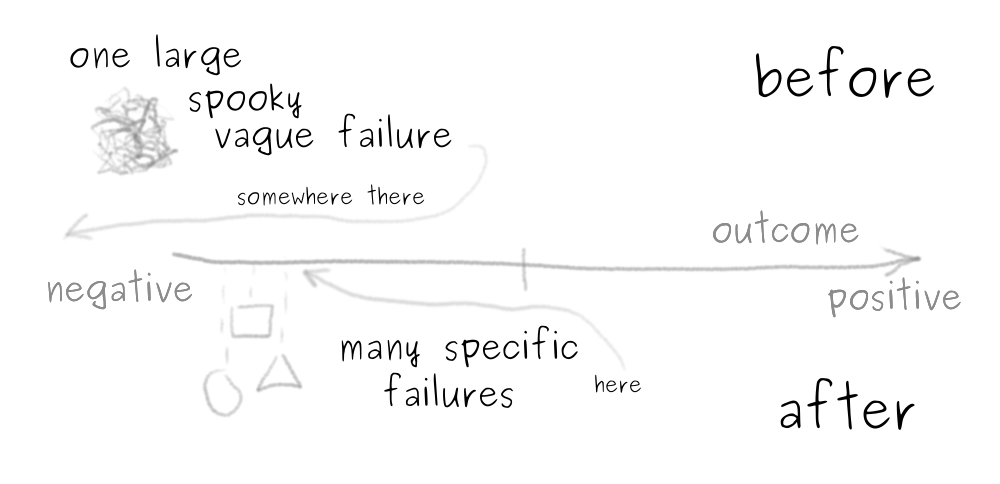The worst that can happen
Asking yourself “What is the worst that can happen as a result of a given activity?” can help you to start doing tasks where you are scared to fail or to avoid dangerous activities. Let’s see how it helps me.
I don’t like feeling embarrassed, failing or showing my incompetence. I’d bet many of you are the same. However, these fears are pretty irrational and they can prevent me from doing or even trying to do something where I can fail. I especially observe this in creative work and large complex tasks. In creative work there is always something sitting inside you and whispering (or shouting) “this is shit, no one will like it, people will laugh at you, don’t waste your time, you know this, just give up and call it a day, do something easy instead, even you don’t like it” and so on. In the case of large tasks, there are so many different parts to it that you just can’t have a complete plan. As a result you are not sure whether what you are doing now actually helps you to accomplish the task. In both cases this is like an internal built-in heuristic against wasting your time. There are situations where this makes sense, but nowadays this is rarely the case.
Asking “what is the worst that can happen” helps me to get through this heuristic. In most creative efforts (like writing this blog post or coding a game) the failure is not as bad as it is perceived to be. For example, I am writing this blog post now and I am not sure whether it will end up being interesting or useful to anyone. But what is the worst that can happen? Someone won’t like this post and may write me an angry email. Or I won’t like this post myself and just delete it completely without publishing at all. Asking this question helps me to change my perspective. Instead of being scared of this abstract notion of a failure (the last word should be read with a spooky voice), I actually try to make it explicit - yes, I can fail, but what does that mean precisely? Is it actually that bad and scary as I think? More formally you just explicitly estimate a lower bound for the outcome. Instead of saying abstract “failing is bad, I don’t like failing” you say how bad it actually is. This gives you something precise to cope with.

One negative consequence present in any endeavor is wasting your time. You did something, it didn’t work out and is of no use now, the time spent doing it is gone (if I add “forever” here this feels even scarier). However, that’s fine. First, you tried to experiment with something, to do something risky and unusual and you didn’t manage. This is much better than just giving up and perhaps you have learned something in the process which may improve your chances next time. Second, even if you don’t “waste” your time on this task, how would you use it differently? At least for me this often means consuming some content (like Reddit or Youtube). But time spent doing this is gone forever too and I am not sure what is better, since I will very likely learn nothing from Reddit or Youtube in majority of cases.
Formulating a task in a specific way can help as well. One can say “I will do this large cool game perfectly and publish it immediately and show to millions of people” and this becomes hard. Just finishing a game is already tricky, doing this perfectly on the first try is impossible. Furthermore, the commitment to publish it just increases the amount of embarrassment you can get. Instead you can say “I will create the first version of my game somehow (it won’t be perfect but will show the concept) and I will show it to 1 person”. This person can even be you.
This blog is a good example of me applying “what the worst that can happen” iteratively. I am definitely not sure whether a given post will be interesting to anyone except me, but in the worst case it will be just there and people won’t read it (or I delete it instead of publishing).
This approach can also be used to avoid dangerous and risky stuff. If you ask yourself “what the worst that can happen” and if the answer does look scary to you (e.g. physical injury for the rest of your life), you probably shouldn’t do this. However, this approach is not perfect and you can’t just follow it blindly. This is just a lower bound of the outcome, which does not take into account how likely the outcome is. Reasoning with this approach one shouldn’t fly on planes, drive cars or even get on the street all, because the worst outcome there is death. Thus, once you feel that the lower bound is too pessimistic, you may consider some more likely outcome instead.
Happy highly motivated creative work!